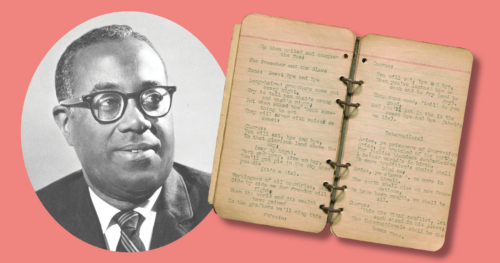Two Texas congregations hold photo scavenger hunts to support the Presbyterian Giving Catalog
April 30, 2021

Belle Christoffersen, a youth member of First Presbyterian Church, Mission, said her favorite part of the scavenger hunt was taking a picture at the canal. She learned that not everyone in the United States has clean water. (Photo by Katie/Brad Christoffersen)
That onetime staple in every youth pastor’s toolkit — the Polaroid scavenger hunt — is getting a makeover and making a comeback.
And during a pandemic, no less.
“When I was trying to think of fun, connectional things our congregation could do separately, yet together, while staying in our cars with our families for safety, I remembered back when Polaroid scavenger hunts were so big,” said Sheri Dittman, commissioned pastor for First Presbyterian Church in Brownsville, Texas, and part-time coordinator for Congregational Development for First Presbyterian Church in Mission, Texas. “Now that pretty much everybody has a cellphone, I thought why not each have ‘quaran-team,’ in their own cars, receive the ‘hunt’ list, and then travel around at a social distance taking pictures of items on the list, all representing the Presbyterian Giving Catalog, then sending them to one person to keep track?”
It was a photo scavenger hunt — with a purpose.
What was purposeful about it was that Dittman, a faithful follower of the Presbyterian Giving Catalog since 2015, had set an ambitious goal for both congregations she serves — namely to buy their way through the entire catalog, which offers a total of 44 gift options organized into seven categories of need and interest in the U.S. and around the world.
Now in its seventh year, the Presbyterian Giving Catalog — which is available both in print and online — is filled with gifts that provide real and positive impact, including aid for refugees, education scholarship funds for communities of color, access to clean water and ways to end hunger.
For the two scavenger hunts — held on Aug. 29 in Brownsville and Sept. 19 in Mission — each of the required photos on the participants’ lists corresponded to an item featured in the catalog, such as livestock or a community garden. Upon locating the listed item and snapping the photo, each team then prayed a prayer written by Dittman or taken from the Giving Catalog to address the corresponding situation. Prior to the hunt, teams had recruited sponsors from the two congregations, each of whom agreed to pay $5 for each photo with all proceeds going to the catalog. Once all the money was collected, the children of each church chose which catalog items to donate.
“In every children’s message, program, or ministry, my goal is to help the children in my congregations to think beyond themselves and toward others,” Dittman said. “The Presbyterian Giving Catalog is our modern-day Sears Christmas Catalog, only now not for ourselves, but for others. This is a good way for us to think of others, not only in our community or only in our country, but around the world and how we can make a difference $25 at a time.”
In addition to raising money for neighbors in need, the children also learned some surprising things as a result of the activity.
“My favorite part was taking a picture at the canal,” said Belle Christoffersen, an elementary schooler from the Mission church. “I learned that not everyone in the United States has clean water.”
Because a latrine is a featured item in the catalog, Dittman had described water in the children’s handout as “a precious commodity that we in the U.S. sometimes take for granted.”
“It never dawned on our kids that even in the U.S. there are many people who are without running water, which includes indoor plumbing and things like where their next bath is going to come from,” she said.
For one of the photos, Jaycee Acosta, an elementary school student from the Brownsville church, posed in front of the sign for an area hospital emergency room to illustrate how the catalog provides vital necessities to border regions. “I might not be able to physically work alongside my siblings in other parts of the world, but I can definitely do my part to assure they, too, have clean drinking water or food and seeds or basic hygiene supplies that I take for granted,” Dittman said. “Any time we can help people — especially children — think beyond themselves is invaluable. Children truly want to start making a difference right now.”
Emily Enders Odom, Communications Specialist, Presbyterian Mission Agency
Let us join in prayer for:
PC(USA) Agencies’ Staff
Donna Jackson, Presbyterian Mission Agency
Susan Jackson-Dowd, Presbyterian Women
Let us pray:
Heavenly Father, although there are many ways to serve you, remind us that we are all part of the same body of Christ. Encourage us to do our part to spread the gospel throughout the world. In Jesus’ name. Amen.








